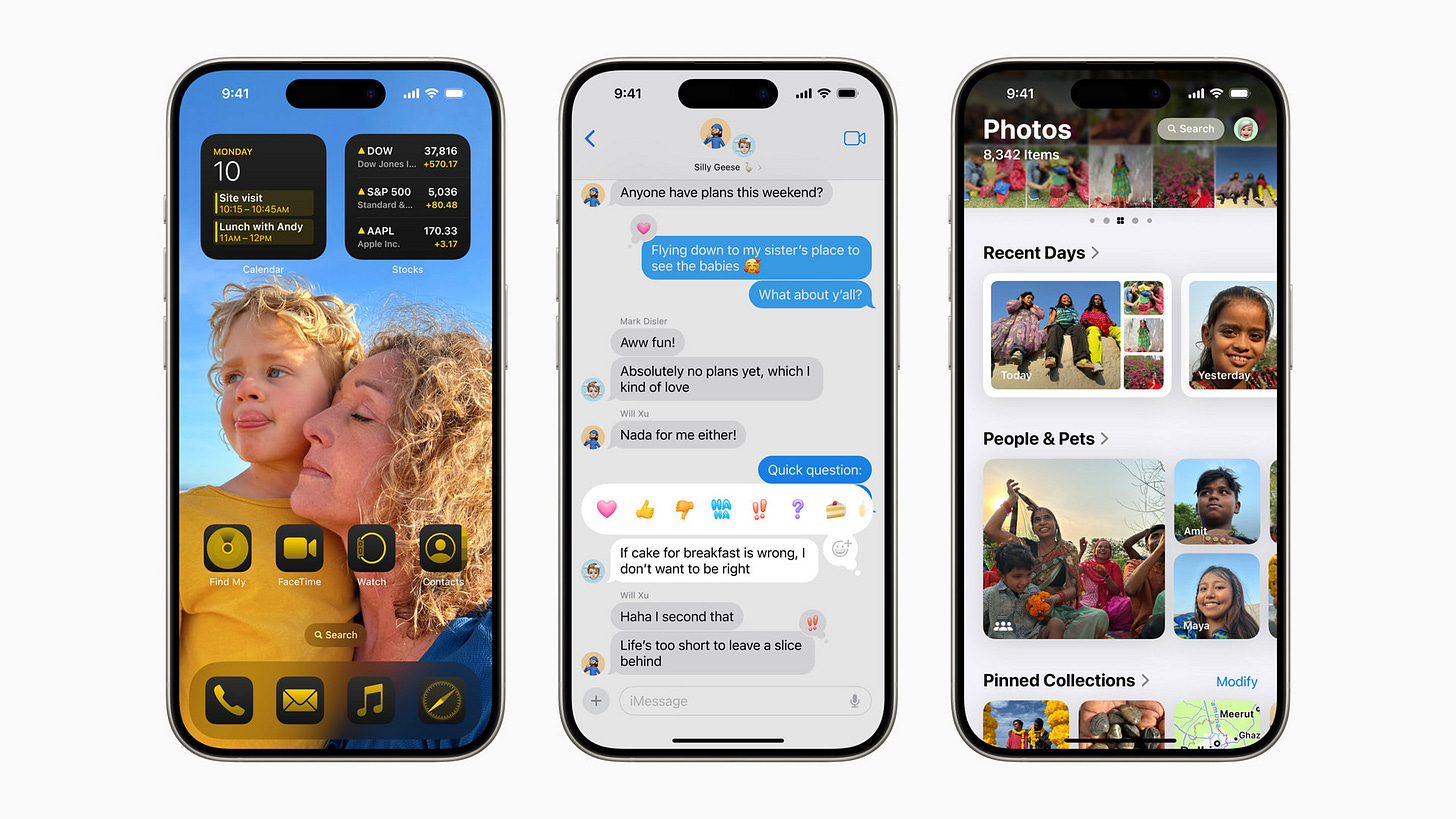The human cost of an Apple update
The tech industry has disrupted emotional growth.
Embedded is your essential guide to what’s good on the internet, written by Kate Lindsay and edited by Nick Catucci.
“‘No one has made this dramatic of a change before.’ —Jojo Siwa” —Kate
On June 10th, Apple announced iOS 18, the newest software release for iPhones. It goes all-in on personalization, with things like home screen customization, text message scheduling, and the ability to “react” using the entire lexicon of Emojis. But one feature stuck out to me (and seemingly everyone else on Twitter): the ability to hide certain apps from people who aren’t you.
This goes beyond just requiring FaceID to access things like photos. Any app placed inside a “hidden apps” folder will be entirely invisible to anyone else looking at your screen. This is a security measure catering to the very specific person whose job is serious enough to require it—but not that serious, since whatever job that is is still being conducted using an iPhone app. I could also see the new feature being helpful for someone who isn’t open about their sexuality but is using queer dating apps.
For most people, however, hiding apps is really only helpful for one thing: being shady. “Cheaters rejoice,” reads a typical reply to the PopCrave tweet announcing the feature.
No one is required to make their apps public, of course. This feature is more so interesting in the context of larger trends in app updates—specifically, what human impulses they seem designed to reward. Most often, it seems, it’s our worst ones, the ones related to anxiety or avoidance. And that goes for technology as a whole. The more this industry innovates, the more we, as people, seem to regress.
The following is a paid advertisement.
How far would you go to discover a lost song? Everyone Knows That: The Search for Ulterior Motives is a new podcast miniseries investigating the internet’s favorite lost song: “Ulterior Motives,” known widely as “Everyone Knows That.” Was it an unreleased demo from a major artist? An AI generated hoax? A track from a small band that never made it big? Explore the theories, hoaxes, and the song’s shocking discovery. Listen and subscribe now wherever you get your podcasts!
Take dating. There are now an overwhelming number of articles (mine included 🤪) that will tell you it’s bad right now. Not “best friend in a ’90s romcom bad”—I mean bad bad. Dating apps don’t work, and meeting people in person seems foreign, even impossible. But it was dating apps that drove IRL connections nearly extinct. In other words, dating apps did work, for almost a decade, by promising to cut out all the things about in-person dating that made us feel vulnerable or uncomfortable. Rejection now happens with a swipe, out of sight, with neither party the wiser. If you match and then change your mind, you can just unmatch without explanation.
But that’s not how healthy human relationships work, and so it’s not surprising that going back to app-less dating isn’t as easy a switch as it sounds. We’re now more scared of rejection, more avoidant of the uncomfortable conversations that are all but inevitable, and altogether despondent. These apps did disrupt dating, but at our expense.
This arc plays out across all kinds of apps, and all kinds of human relationships, as tech companies seek to find and solve every type of “friction” and discomfort. But those efforts are rooted in the mistaken idea that being a person shouldn’t come with difficult emotions—that we aren’t often, in fact, served by hard conversations or uncomfortable feelings.
And yet, innovation charges forth. And it’s not just in the little things like hiding apps. I’ve been working on an article about AI, and in my research for it came across the burgeoning industry that aims to turn dead loved ones into chatbots. Whole companies have emerged to “help” loved ones with their grief. When I watch the videos and hear the stories of grieving people resorting to these chat bots, I am moved. I understand the draw. But I don’t need to know much about psychology to know this doesn’t help with grief. It help us avoid it.
Being uncomfortable and vulnerable teaches us lessons about ourselves, and I get genuinely anxious thinking about what people, relationships, and human interaction will look like in a generation that’s never had to feel anything but the emotions they like and uses technology to push away everything else. How will we disagree? Compromise? Empathize? It’s a big question, but it starts small, all the way down to one, now invisible, app.



